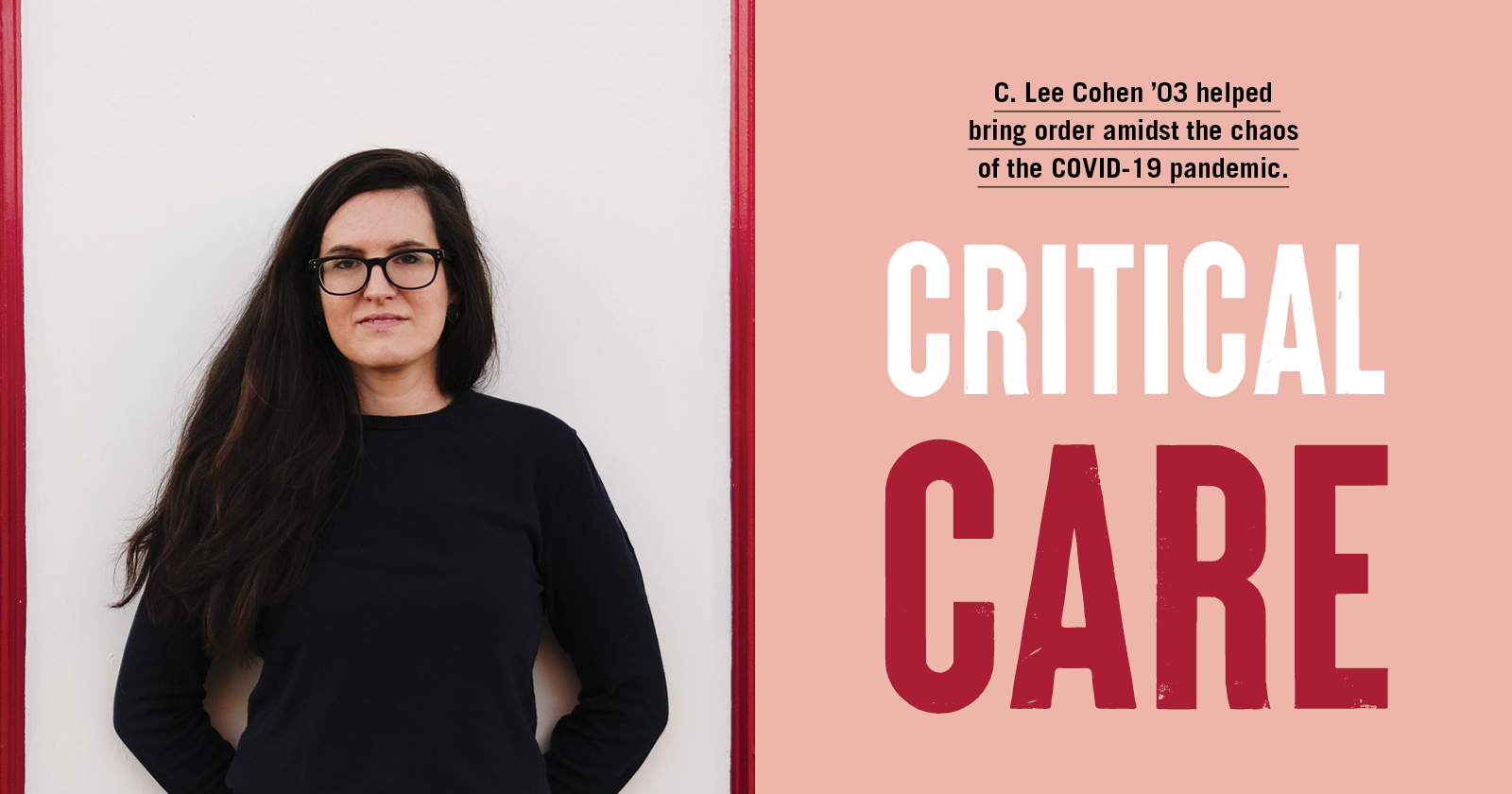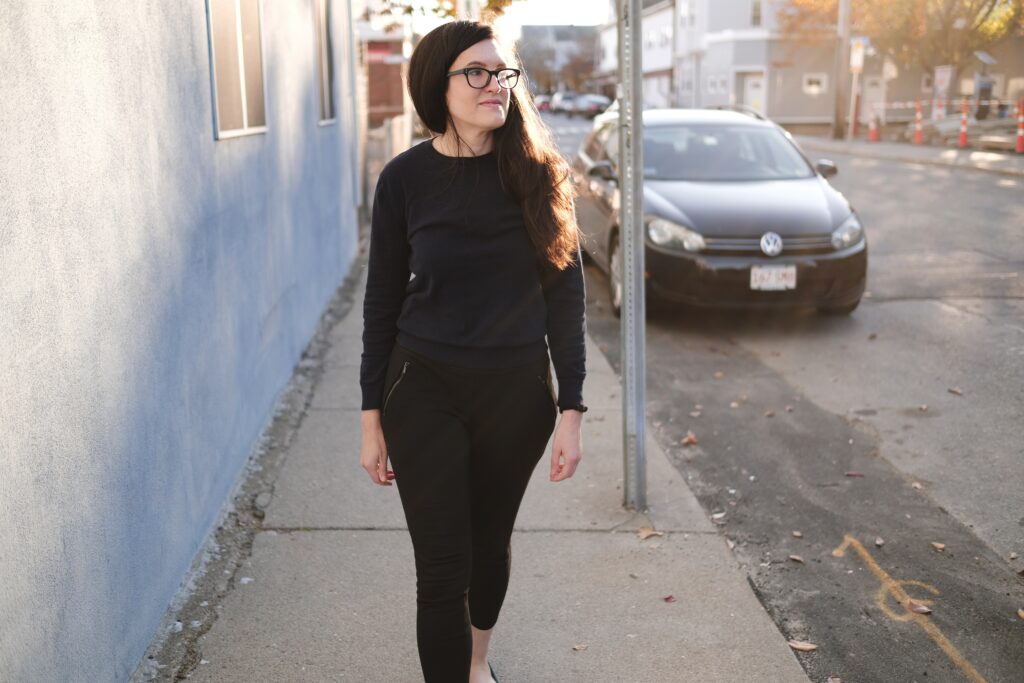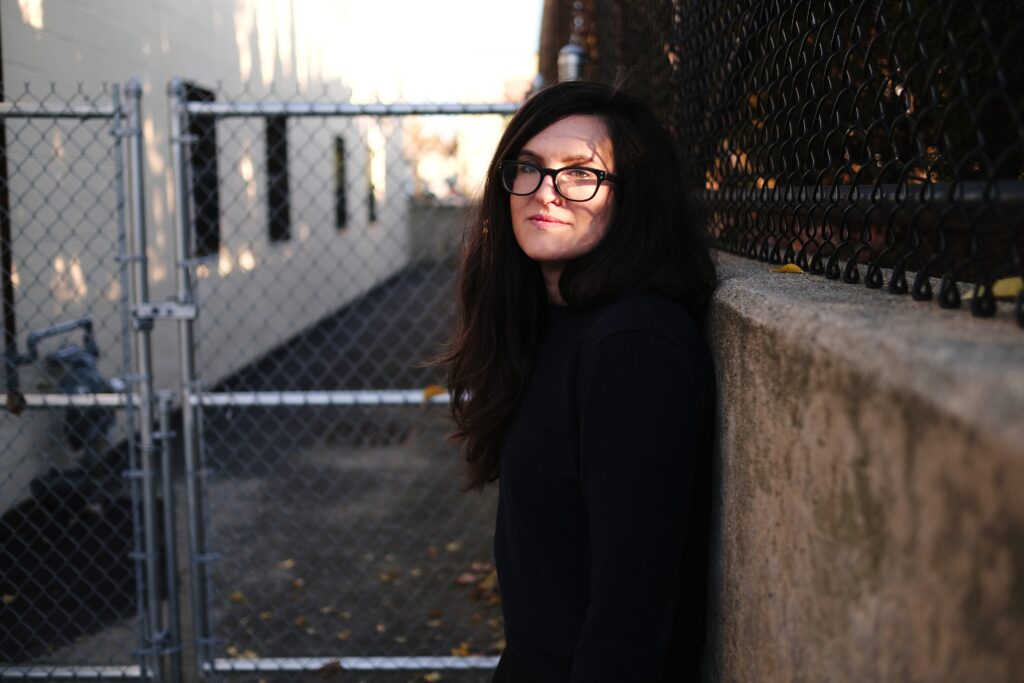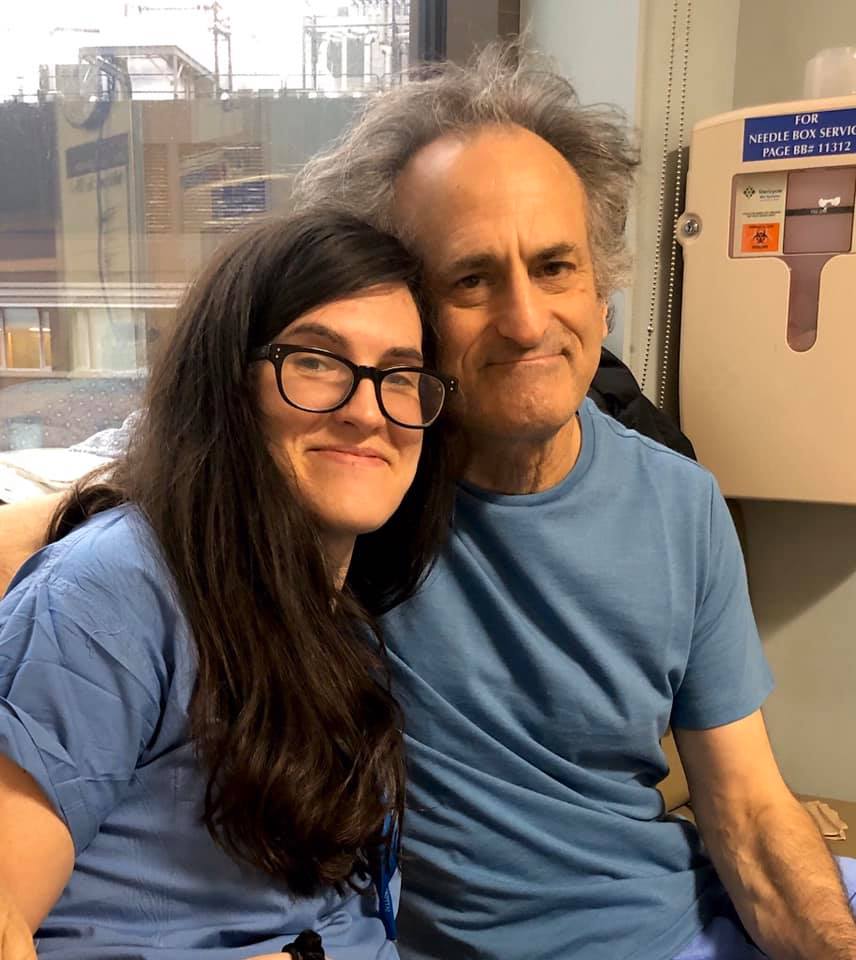
Story by Darry Madden | Portraits by Channing Johnson
In March 2020, when New York’s eight million residents locked their doors and pulled their curtains closed, the city’s subways went dark, and its streets emptied out, the rest of the country held its breath, unsure of the scale of the tragedy that was about to unfold. A limp federal response aggravated the tremendous fear. For want of leadership, doctors and nurses wore trash bags and homemade masks.
At least, that is one version of the story—chaos and disconnection.
At that moment, C. Lee Cohen ‘03, a critical care and pulmonary specialist at Brigham and Women’s Hospital in Boston, was attending to her father, Brian Cohen, who was receiving cancer treatments at her hospital. (Many readers know Brian from his decades of service to The Putney School in many roles, including as printmaking teacher and writer for this magazine). She had paused her duties caring for other patients in order to limit her exposure and keep him safe.
It was in this unexpected space that another story in the pandemic was born, one of order and partnership, duty and responsibility.
Because she could not participate in clinical work, Cohen spearheaded covidprotocols.org. Don’t be fooled by its quiet and unassuming name. Or the fact that it is a website among billions of websites. Covidprotocols.org is a mammoth feat, containing many textbooks worth of clinical care information about caring for COVID-19 patients, that has been used by hundreds of thousands of doctors and nurses.

The first information was up online within the month of March. Initially, it contained the best knowledge in critical care that Cohen and her colleagues could discern from their own experience and their conversations with others in Seattle, New York, and Wuhan. But as the weeks turned to months, Cohen and her team of nearly 300 were able to compile much more data and knowledge and covidprotocols.org expanded from how to handle a crisis, to a much more nuanced set of standards for caring for COVID-19 patients from nearly every medical vantage point.
Cohen left Putney with an appetite for stepping out of her comfort zone (to which she gives some credit to AM barn duty).
First, she pursued a degree in development economics and international development at Brown University. This took her to Mali, in West Africa, where, after working in healthcare delivery, she founded Mali Health, a healthcare delivery not-for-profit organization that developed innovative strategies for child survival in resource-poor urban areas. She wound up supporting health care workers who were doing contact monitoring and contact tracing during the Ebola outbreak there—her first exposure to pandemic response. She also became involved with a diagnostic device startup that creates point-of-use (versus lab-based) blood tests for the developing world.
What began as an interest in global development became a passion for global health. When she returned to the U.S., she entered medical school. And if things were not sounding ambitious enough, she paused medical school between her third and fourth years and completed an MBA at Harvard Business School. She says this path ignited her interest in infectious disease diagnostics.
I think it’s one of the true problems that we as a society are facing—antibiotic resistance and infectious disease testing. It’s one of the only fields of medicine that’s actually moving backwards, not forwards,” said Cohen.
(Today, in the last year of her fellowship, she’s also working as a researcher at the Broad Institute, an infectious disease lab.)

Cohen speaks quickly. She moves quickly. She has many irons in the fire. At 35, she’s an MD/MBA with a few careers already behind her and it’s unclear how many in front of her. Her earliest life, however, was less worldly, more bucolic, tucked up on the hill on Putney’s campus. Her father, Brian, explained that she was raised there until the age of eight. They lived in John Rogers dormitory, surrounded by kids and adults and a contingent of family friends by whom she was “sort of adopted and doted on and taken seriously,” said Brian.
“She was kind of a free spirit,” said Brian, describing an early childhood filled with curiosity.
She returned to Putney for high school. Kristin Dawley was Cohen’s rowing coach and history teacher at Putney.
“She was really coachable and really teachable,” said Dawley. “Some kids are so smart and so smug, and she had every right to be smart and smug with me—she’s really smart—but she never was smug.”
Dawley describes a naturally gifted student, but also one willing to work at it. An independent study course that Cohen designed for herself was dedicated to revising papers she’d written for previous courses. She involved three or four teachers and enlisted them all in the effort. She wanted to figure out how to be a better writer.
“It wasn’t high school-level stuff,” said Dawley.
In her own self evaluation, Cohen owned up to not being a “natural” athlete.
“It was not easy for her. But she just would show up, work really hard, train, and bring her full self to every practice. And she did really well. She was a really strong member of the team. I think that was it—it’s not that this person is completely superhuman in their brilliance. She’s superhuman in her ability to show up to everything she does with her best self.”

Brian, Cohen’s father, was hospitalized in early February of 2020, just before COVID-19 hit New York and shut down New England. He was undergoing intensive chemotherapy, and had minimal immune system function. Cohen had done some time in the ICUs at Brigham and Women’s but stopped for fear of bringing the virus to Brian.
It was during one of these days that she showed up at Brian’s bedside and began to cry.
“The thing she hates most in life is to feel sidelined or useless, and she did, to a certain extent. Because she wasn’t in the clinic anymore,” said Brian.
This was the moment the protocols arrived on her doorstep.
“I ended up taking on the synthesis and integration of a lot of literature and data, and then talking to all of the authors and asking if they wanted to make it publicly available, which they did,” said Cohen.
More people than expected were interested in the information. Cohen explained that the many smaller hospitals across the country have one, maybe two, intensivists working full time in their ICUs. They don’t have the time to spend hours reading and poring through the data.
Early on, covidprotocols.org was addressing clinical care concerns like how early to intubate a COVID-19 patient, how much fluid should be given or not given, and if antibiotics have any place in the treatment of patients with this virus. It also covered infection control in ways like recommending fewer CAT scans for COVID-19 patients, because transporting a patient to a CAT scanner is difficult to manage without exposing more hospital staff and the patients who follow.
The protocols became more robust and specific as more information became available, and now contain information from the different medical departments—endocrinology, cardiology, hematology, neurology. For example, COVID-19 affects how one metabolizes glucose. So if a diabetic patient has COVID-19, that changes how you manage a diabetic crisis. Another example is therapeutic anticoagulation. Patients clot a lot with COVID-19. The protocols suggest higher than normal prophylaxis against clots, but not full-blown therapeutic anticoagulation.
Cohen is one of about 5,000 pulmonary critical care-trained people in the U.S.
I think we all felt a huge obligation really early on to do a thing that was bigger than just the immediate care of patients as people who had the closest thing to expertise in critical care management of this type of patient,” she said.
As of this writing, the first COVID-19 vaccines have been administered, treatment has improved dramatically since the early days of the virus—intubation usually happens later, and steroids are a part of treatment (“a huge paradigmatic shift,”)—and Cohen herself is back in the ICU. Brian is home, retired from Putney, and doing well.
She says that, in some ways, this has been professionally rewarding. But it can also be “really, really hard,” she said. “A lot of people were left traumatized by not being able to see their loved ones at the end of their life, and that’s been traumatic for clinicians, too—to be the arbiter of that experience for people and the only point of contact in that moment.”
Is hers a Putney path? We don’t often think of the frontlines of medicine when we talk about the “outcomes” of a Putney education.
“What is a Putney path?” asked Cohen. “Because I think I have a very Putney path. It’s been an itinerant career, and an atypical medical path—I’m much older than the other people in my fellowship year.”
“Especially if you’re not great at drawing or milking cows, Putney’s design is teaching you a really foundational lesson that I don’t think is replicable,” she said.
She believes that the breadth of experiences Putney requires forces students not only out of their comfort zones, but into a place where success and failure are well-tolerated—even welcomed—as key to progress.

